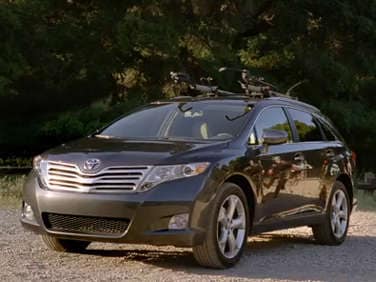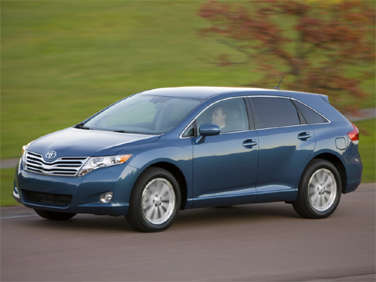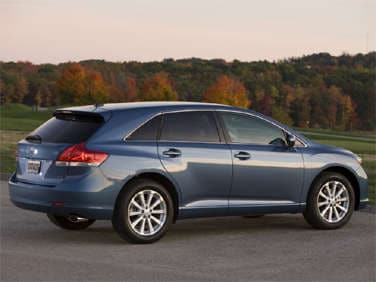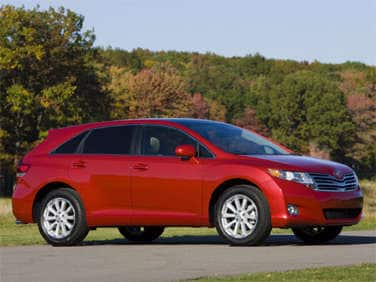Recent Articles
Popular Makes
Body Types
Toyota Venza: A Baby-boom Sales Boom

Toyota's ongoing efforts to make a success of its youth brand took another baby step forward recently, and I don't mean (solely) by releasing launch info for the Scion iQ—I'm talking about the automaker's ad campaign for the 2011 Toyota Venza.
The spots are pretty funny, putting a different twist on the generation gap existing between the baby boomers and their own now-grown babies. For example, there's the one with the 20-something daughter complaining about how hard it is to convince her parents to join the Facebook revolution and stay (virtually) active, while said parents are busy using the Venza as a launch pad for their extreme trail-biking adventures.
Beyond the humor, the ads are notable for something else, too. While the vast majority of automakers are actively engaged in pushing down the average age of their customers at all costs, the Toyota Motor Corporation seems to have made an explicit decision to start positioning the Toyota division as a brand for the chronologically challenged.
It makes a certain amount of sense, with the sizable baby boomer population cohort still owning a nice chunk of buying power, and as I mentioned, it helps support Scion by more firmly establishing a difference in demographics between it and the Toyota brand. The Toyota Venza makes for a nice foundation from which to kick off this approach.
Avoiding the "S" Word
There's a minor kerfuffle going on in the industry right now over a certain Ford exec who really really doesn't like the way they do business at General Motors. But frankly, I found his use of the "f" word much less shocking than the "s" word that recently came out of the mouth of Ralph Gilles, new head of the Chrysler Group's new SRT brand. In an interview that showed up in the New York Times, Gilles was talking about reviving the Dodge Magnum, and not the least of his reasons was because, "With the Magnum, we owned the station wagon segment."
Yep, he really used the word(s) "station wagon" to describe a semi-modern-day vehicle.
The thing is, aside from Gilles refreshing candor, mainstream automakers avoid station wagons like the plague, out of a perhaps misguided belief their customers will do the same. Thus, instead of a Toyota Camry wagon, we have the Venza. Which, in truth, is likely a better-looking vehicle than a more traditional Camry wagon could ever be, and it does provide a few extra inches between the bottom of the car and the open road, thanks to 8.1 inches of ground clearance (2.8 more inches than the Camry and the same as a Jeep Compass).
The Venza also gets a tow rating of up to 3,500 lbs. (when properly equipped), a few hundred pounds of extra curb weight, available all-wheel drive and a noticeable ding in EPA ratings. The Camry can get up to 22 mpg city/33 mpg highway/26 mpg combined versus the Venza's 21/27/23.
One last comparo: The Camry starts at $20,195; the Venza, $27,125.

The Numbers Game
The Venza makes for an interesting package that sort of splits the difference between the Camry and the Toyota Highlander, and I would have picked it to be a modest winner for the company. The state of the industry in recent years, however, makes it difficult to get a handle on the Venza's popularity. It racked up 54,410 sales in 2009, it's first full year on the market, and that drifted down 12.5 percent in 2010. On the other hand, the Toyota recallathon certainly influenced its performance, with standard-bearers like the Camry and Toyota Corolla seeing sales fall 7.5 percent and 9.8 percent, respectively, during the same time.
The car's downward glide continued through the first half of 2011 with its June sales drop of 7.4 percent actually representing a good month for the Venza; it's year-to-date sales are down 29.2 percent through June.
Again, outside circumstances—especially the spring disasters in Japan—make it hard to draw definitive conclusions about the acceptance of the car itself.

The Golden Years to Come?
A lot of observers point to the coming launch of the next-gen Toyota Yaris and Camry as potential turning points for the automaker, and it's hard to downplay their expected impact, particularly for the Camry. While quite a bit of the car buzz has shifted to the compact segment—home of new entries from just about everyone, including the Chevy Cruze, Ford Focus, Honda Civic, Hyundai Elantra and VW Jetta—that could simply reflect the relatively old lineup of players that currently works the bigger segment.
Once fresh mid-sizers like the all-new Camry, 2013 Chevrolet Malibu and completely redesigned Volkswagen Passat come online, that will start to change, and there's much reason to believe the Camry will reclaim its crown as the best-selling car in the U.S. - especially if it's positioned the same way the Venza is.
Toyota just has to be careful it isn't trading away its future prospects for short-term success. While the number of people in the U.S. aged 60 and older is growing quickly—which means so, too, are the number of people in the U.S. who are likely to respond positively to Toyota's "gray is the new green" marketing—this won't go on forever. If the company ends up with the kind of reputation Buick had until very recently, as a brand aimed at old people and desperately trying to find a way to replace its aging customer base, observers are going to say Toyota's current baby-boom strategy really blew up in its face.
Check out Toyota's recent Venza ads on YouTube below:

Photo by Toyota Media